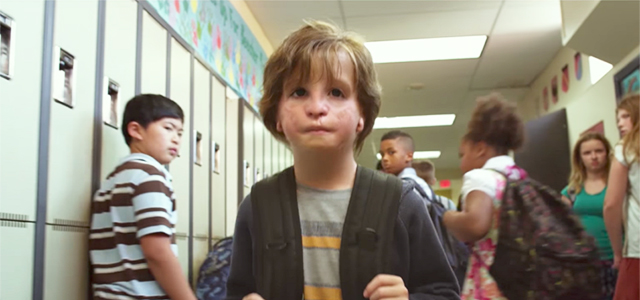Review: Wonder (PG)
Starring: Julia Roberts, Owen Wilson
Two of my three boys suffer from a rare genetic condition known as Ocular Motor Apraxia (OMA). It messes with the brain’s ability to learn, taking the hard-won neural pathways you lay down every time you master a skill, and erasing them at random. You can take weeks to learn a word – like ‘Dad!’ – and lose it the next day. Some things can be made to stick over time, but that time is often measured in years. It’s a little more complicated than that, but OMA basically affects everything from reasoning to walking – and my oldest son has it bad. He will probably live in the world of an eight-year-old for the rest of his life. So, you can see why, as a father and a scriptwriter, I have more than a passing interest in stories about people with disabilities.
August Pullman, better known as ‘Auggie’ to his family, suffers from his own rare genetic condition called Treacher Collins syndrome. He required extensive plastic surgery growing up, leaving him with the sort of face that literally makes small children cry. Auggie, played by Jacob Tremblay, has been home-schooled for the first ten years of his life. However, his parents – played by Julia Roberts and Owen Wilson – believe it’s time he takes his first steps into the outside world. They enroll him in fifth grade at a local school, and the plot takes the path you would expect. Auggie is bullied by boys who call him ‘Gollum’ and ‘Darth Sidious’. However, he’s blessed with a couple of real friends, and his character ultimately makes a world of difference. But that’s not what impressed me.
Wonder sets itself apart as a film by employing a unique storytelling device. Every 20 minutes or so the film changes its perspective. The story begins with Auggie, but then shifts to the point of view of his mother, followed by his sister, then his best friend, and so on and so on. Auggie always remains at the centre of this little universe, but what we’re gifted with is a much more informed and emotionally accurate view of what it means to live within the orbit of a child with a disability. Auggie’s mother Anne is a pragmatic personality, but she finds herself praying desperately as he enters his school alone – “Oh God, please don’t let them hurt him…” – and her heart breaks weeks later just at the sight of a single child laughing alongside her boy. Auggie’s sister Via loves her brother, but finds herself telling a boy she meets at high school that she is an only child. And Auggie’s father, Nate, digs deep to find the wisdom his son desperately needs, then cries silently in the kitchen when the dog dies, because that’s just one thing too many to handle that day.
Wonder doesn’t have a strong Christian message to share. There is no God standing close, just as He promises, to bear the burdens of His children. In fact, some of the morals Auggie’s teacher shares amount to little more than sophisms, extolling students to always choose kindness because truth can hurt. Yet there was one precept, written on Auggie’s blackboard, that particularly caught my eye:
“Your deeds are your monuments.”
I guess it resonated strongly because it was so familiar. Two thousand years earlier, Jesus said something similar: “By your fruits you shall know them.” Auggie’s teacher was right – long after you are gone, people will remember you for what you do. But it’s Jesus’ words I’m hoping my son will one day learn. Because, more importantly, it’s the kind of deeds you do that will tell people what you believe. If we live like Christ, love like Christ, speak the words of Christ, then no one will ever doubt that we follow Christ. Not doing so is just as clear a message.
I really valued the multifaceted insight Wonder shares with those who haven’t had much to do with disability. And those who have will find a great understanding of their good and bad days. I also hope my boys will grow up to practice kindness, without letting go of what is right. But most of all, I hope they realise that, disability or no, they can always bear the sort of fruit that says, “This one loves Jesus.”
Mark Hadley






1 thought on “Your deeds are your monuments”
This is my first time watching the movie and heard the phrase”your deeds are your monuments”,and I Googled it to find more insight in the phrase only discover the movie I was watching… ladies and gentlemen I was really touched by what I have seen.
To add more, I have learnt how to treat all around me same way no matter their health status or whatsoever.